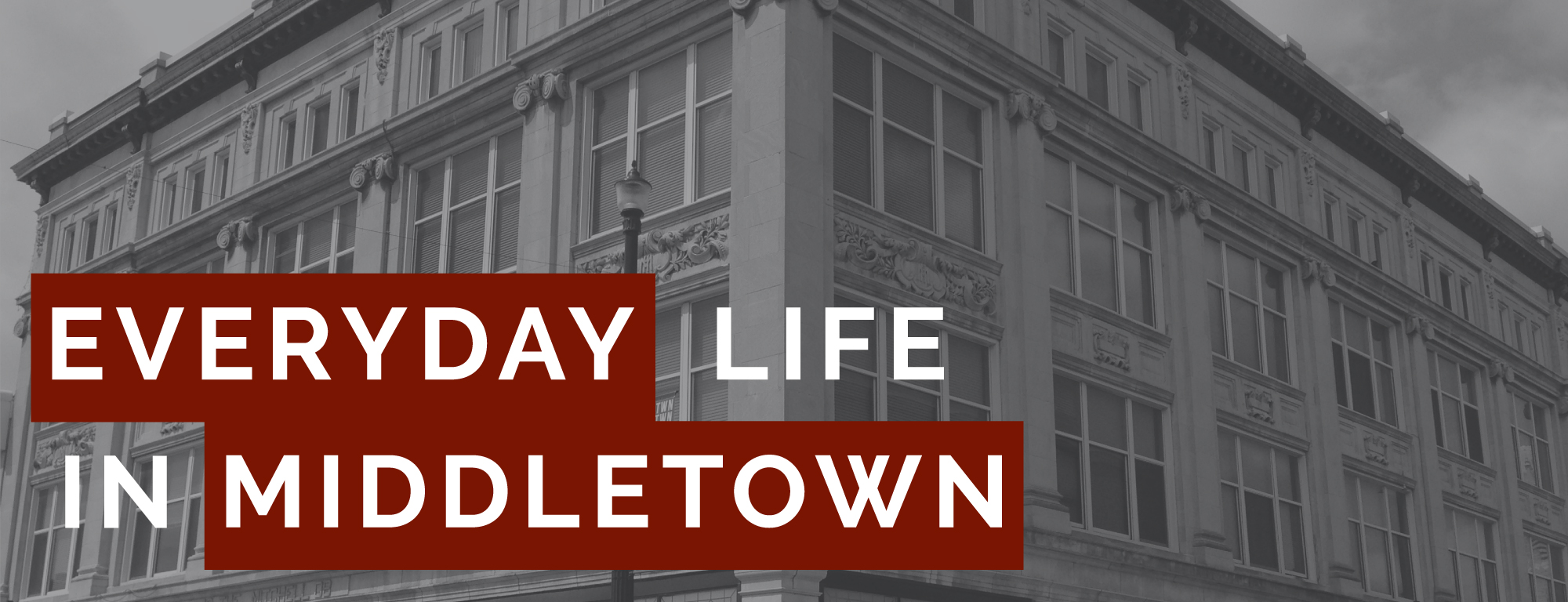For this summer’s writing project, we asked our volunteers to talk to us about work and online life. Their responses are now on the Everyday Life in Middletown online archive, where you can read them here.
In our next two blog posts, we underscore some themes from the summer directive. Next week we’ll survey the responses about online life. Today, some highlights from our writers’ thoughts and reflections on work.
We asked how people feel about their work; asked them to describe their workdays; and asked how they define work, and whether effortful, non-paid activities (such as housework, caregiving, even active hobbies) constitute “work” for them.
The last question prompted some interesting ruminations. One writer, who provides clients with a professional service, said he enjoys his job so much that he doesn’t consider it work. Work constitutes “doing necessary things that I don’t like,” such as “paperwork and details” and “cleaning my room and cutting the grass.” Most of his professional work involves “talking to clients, interacting with people, getting to know them and how to better serve them.”
This attitude towards work has come in adulthood—as a child, J89 writes, he disliked his household chores. The transition to a fulfilling work life inspires J89 to see it in a Biblical framework: “Before the fall in the Garden of Eden, Adam and Eve had ‘work’ to do. So work is not a result of sin and the fall, but something that is good and adds value to life.”
Diarist A34 similarly adopts a Christian framework to validate work. Reflecting on the effort involved in the volunteerism he and his family members practice, he observes: “We never received financial payment for that work, but we helped improve our community and one day GOD will judge us accordingly.”
J89 is one of three writers to pull out the old saw, “Love what you do and you will never work a day in your life.” Others, though, approach it with various levels of skepticism. Diarist A23 sees some wisdom in it but adds “I hate how hokey that old chestnut is.”
Diarist C46 offers a sharp and witty exploration of the multiple usages of “work,” quoting Dolly Parton’s “Nine-to-Five” and adducing such varied phrases as “work-life balance,” “working hard or hardly working?” and “working out.” She concludes with a variation on the chestnut:
Choose a job you love, and you’ll never work a day in your life. (Pretty sure THAT’S not the correct use of the word).
For Diarist J88, something counts as work if it advances a goal; thus gardening, a hobby, constitutes work, even though it is pleasurable.
In contrast, Diarist A02 classifies any effortful thing he doesn’t especially enjoy as work, including cooking. Exercising, which provides relief from work stress, does not count as work.
Responses also reveal aspects of life that require effort—and even bring difficulty—but that aren’t typically acknowledged as work. Diarist A15, a retiree, remarks on the effort that goes into making herself look nice:
“Another chore I think of now which I used to not consider is just how much time it takes as a woman to look presentable. It’s annoying to do all the personal hygiene things that I’ve done for decades all the while Father Time is working against me. It’s a lot of effort.”
Diarists A23 and C46 both note the presence of emotional labor in life. Diarist A23 notes that dealing with recalcitrant administrators is “emotionally laborious.” Diarist C46 remarks on the emotional labor of personal interactions and private relationships:
“Another area of work that often goes unmarked is emotional labor. (It’s interesting that the term labor is more often used here than work.) When we do mediation, we stress that it is “hard work.” When people talk about relationships, particularly life-long partnerships, they stress that it requires work….Relationship work is some of the most important work we do.”
Several writers illuminate the degree to which work underlies identity and how the pursuit of ambition and increasing professional rewards structures our internal life stories. Diarist A23 observes that having the sense of a “next rung up the ladder” offers him a “promise…to work towards.” Diarist A01 admits to having enjoyed work more when he felt like he was “climbing the ladder” even while acknowledging that doing so led him “not infrequently to the brink of exhaustion.”
Diarist A34 recounts the depression his father experienced after physical disability removed him from the paid workplace—and how he subsequently achieved meaning in his life by serving his community as an organizer.
Whether one gets paid for it or not, work is one of the most powerful forces in structuring our everyday lives. This set of directives speaks to how we define it, how we experience it, and how we think and feel about it.

